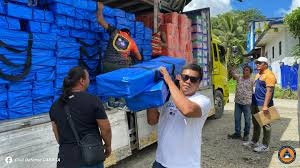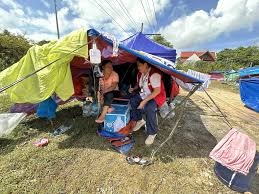MANILA, Philippines — The collaborative efforts between national agencies, local government units (LGUs), and civil society organizations (CSOs) have significantly accelerated the response and early recovery efforts for families affected by the magnitude 6.9 earthquake in Cebu, according to Department of Social Welfare and Development (DSWD) Secretary Rex Gatchalian.
Speaking to reporters during his third visit to Cebu, Secretary Gatchalian credited the rapid progress to President Ferdinand R. Marcos Jr.’s directive mandating a “whole-of-government approach.” This concerted effort resulted in critical breakthroughs in disaster operations, providing faster relief to affected families and individuals in northern Cebu.

The Concerted Strategy: Lightening the Burden
Secretary Gatchalian emphasized that no single government branch could handle the disaster’s scale alone. “It’s a whole-of-government approach. We know that it can’t be done by a single agency of the government and the order of the President is for all of us to work as one to lighten the burden of earthquake victims,” he stated.
One of the President’s key instructions was the immediate establishment of tent cities to provide safe, temporary shelters for Internally Displaced Persons (IDPs).
Relief Operations and Shelters
Across northern Cebu, five tent cities have been successfully set up through the combined efforts of national agencies, currently accommodating approximately 1,227 families. These sites include:
Bogo City
San Remigio
Medellin
Daanbantayan
Tanuan City
In San Remigio, the temporary housing is a multi-agency effort:
The DSWD provided family tents.
The Department of Human Settlements and Urban Development (DHSUD) constructed modular housing units called ‘smart houses’.
For the Bogo tent city, the Philippine Red Cross built the facility, while the DSWD took on the responsibility of providing daily hot meals.
Sustained Support and Commitments

The DSWD serves as the camp manager for the San Remigio tent city, ensuring a secure environment where women and child-friendly spaces have also been established. The agency is also ensuring consistent food provision through four mobile kitchens stationed across Bogo City, San Remigio, Medellin, and Daanbantayan.
Gatchalian reassured the public that whether IDPs are in family tents or DHSUD-built modular units, they have safe and comfortable homes. He stressed that the immediate establishment of the tent cities demonstrates the President’s commitment to providing comprehensive and speedy help for traumatized families.
He also confirmed that all other commitments made by President Marcos Jr., such as providing electricity, food, and water, were delivered by the respective government agencies.
While acknowledging the difficulty in estimating when full recovery will be achieved, Secretary Gatchalian assured Cebuanos that the entire collective government will continue its hard work to help them recover and return to normalcy.





